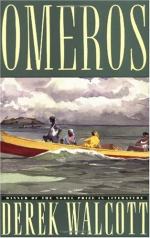|
This section contains 7,860 words (approx. 27 pages at 300 words per page) |

|
SOURCE: Ramazani, Jahan. “The Wound of History: Walcott's Omeros and the Postcolonial Poetics of Affliction.” PMLA: Publications of the Modern Language Association of America 112, no. 3 (May 1997): 405–17.
In the following essay, Ramazani examines Walcott's metaphorical treatment of New World African slavery and postcolonial Caribbean suffering in Omeros, as signified by Walcott's evocation of physical trauma, unhealed wounds, and aspects of recovery.
“This wound I have stitched into Plunkett's character,” ventures the poet in Derek Walcott's Caribbean epic, Omeros (1990). Conflating wound and suture, Walcott suggests that the odd surgery of poetry may have to disfigure a character with wounds to repair historical injuries: “He has to be wounded,” continues the poet defensively. Why must the poet stitch some kind of wound into all his major characters, from Philoctete, the emblematic black descendant of slaves, to Plunkett, the representative white colonial; from the lovelorn Achille to Hector, Helen, even himself? Because...
|
This section contains 7,860 words (approx. 27 pages at 300 words per page) |

|


